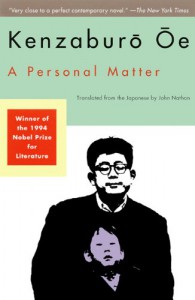
This novel is about a man who confronts or actually tries to run away from every step towards adulthood. As his wife is about to give birth to their first child, Bird is confronted with responsibility that he starts to actively run away from. Bird, a nickname to indicate his immaturity, is at a crossroad of either choosing to continue running away from adulthood responsibilities or to grow up and become a responsible grown up.
In fact, the story is primarily spent dealing with Bird preparing to run away. It was interesting. I find that this appears to be a common trope in Japanese Literature whether it be male or female. They are rebelling against the expectations of adulthood and are lost.
This story is full of angst and the struggle of coming to terms with adulthood and being an active participant in life rather than coasting through it.
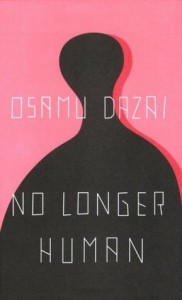 I had wanted to read this book for awhile especially seeing it referenced in Japanese pop culture. The writing style seems a bit awkward for me. I didn't like it at first but then got wrapped up in Yozo's story. It is a story about the progression of Yozo's life and his disconnection from the world around him and his struggle to try and connect. As each phase is unsuccessful, you always hope that he pulls through. At times, you would think of an individual with teenaged angst; other times, you might see an individual in a deep depression.
I had wanted to read this book for awhile especially seeing it referenced in Japanese pop culture. The writing style seems a bit awkward for me. I didn't like it at first but then got wrapped up in Yozo's story. It is a story about the progression of Yozo's life and his disconnection from the world around him and his struggle to try and connect. As each phase is unsuccessful, you always hope that he pulls through. At times, you would think of an individual with teenaged angst; other times, you might see an individual in a deep depression. While the notebooks were compelling, I found the prologue and epilogue very different. At first, I thought it was Yozo looking back but no, it was a different person altogether. They had intense disgust for Yozo from beginning to end. I guess in some naive way, I was hoping it was a healthy Yozo looking back on the old Yozo but even if it was so, the intense disgust would still be unhealthy.
The Need to Please: Mindfulness Skills to Gain Freedom from People Pleasing and Approval Seeking
 Full Disclosure: Book was won through First Reads Giveaways.
Full Disclosure: Book was won through First Reads Giveaways.This book is very readable and accessible. The writing is formatted so that you can quickly read each section. It is also handy if you need to quickly refer back to a particular section. This is by no means comprehensive but more of a kickstart self-help book. The philosophy and main focus is mediation and mindfulness while describing everything in layman's terms as well as applied to everyday scenarios.
If you are not receptive to the concept, then this book will not be helpful to you. However, if you are looking for a starting point to calm your self-doubt and criticism through mediative methods, this might be a good start for you.
 I really enjoyed this novel. It has a good combination of Murakami's signature character development as as well as his surrealistic style. Okada, our male main character almost seems like your typical Murakami disconnected male character -- at least he seems that way, at first.
I really enjoyed this novel. It has a good combination of Murakami's signature character development as as well as his surrealistic style. Okada, our male main character almost seems like your typical Murakami disconnected male character -- at least he seems that way, at first. While he does have disconnected elements to his life, his character evolves and he takes decisive action whether it is good or bad. There is a mystery afoot which starts with their missing cat and then his wife, Kumiko. Again, there is a vast array of rather eccentric characters who play a part in the mystery.
I also love that the conflict which arises doesn't get solved so quickly. The story timeline spans nearly two years since his wife disappears.
1Q84 and this novel definite rates as one of my favorite Murakami works.
The Old Capital
 I read it but didn't see the point of it. I wonder if it might be the translation because the language was stilted and awkward at times. It also didn't flow as well as other translated works. While the premise was interesting, the development just seemed to spin its wheels. It's kind of like Thomas Hardy, a lot of description about the scenery and everything else but this story had very little to no character development.
I read it but didn't see the point of it. I wonder if it might be the translation because the language was stilted and awkward at times. It also didn't flow as well as other translated works. While the premise was interesting, the development just seemed to spin its wheels. It's kind of like Thomas Hardy, a lot of description about the scenery and everything else but this story had very little to no character development. The first part is a collection of interviews bringing to life what happened in the Sarin Gas Attacks in Tokyo. You get a sense of the confusion as well as the moral dilemma faced by ordinary citizens and how emergency services were woefully unprepared for such an event.
The first part is a collection of interviews bringing to life what happened in the Sarin Gas Attacks in Tokyo. You get a sense of the confusion as well as the moral dilemma faced by ordinary citizens and how emergency services were woefully unprepared for such an event. The last half was written later due to criticism received by the initial publication. Here you have interviews of various members of Aum, the cult responsible for the attacks. Aside from the brief description, I couldn't muster up the will to read their stories.
This was a good read and helped give a sense of what went on before, during and the aftermath. It is real human stories.
 This story deals with the last Belfour sister, Dahlia set in a beauty and the beast setting. The book was fun and all about misunderstood characters. I guess you can say it's Shrek without the fairy tale companions. While the interactions between Dahlia and Kirk were fun, their relationship development was awkward and the resolution pretty high handed.
This story deals with the last Belfour sister, Dahlia set in a beauty and the beast setting. The book was fun and all about misunderstood characters. I guess you can say it's Shrek without the fairy tale companions. While the interactions between Dahlia and Kirk were fun, their relationship development was awkward and the resolution pretty high handed. The Duchess and Lady Charlotte were amusing but played very small roles. I was a little disappointed as these two really stole the show in the first novel but haven't had much of a role in subsequent stories.
All and all a nice brain eraser.
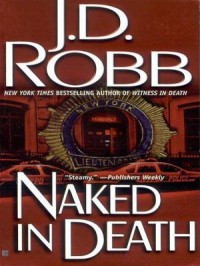 This was a very good romantic suspense novel. The protagonist, Eve Dallas is a strong cop with her own demons. She's a bit hard-boiled. The story is set in the future but not so distant that you can't follow along. A horrible murder has been committed and our heroine is the one responsible for justice. Of course, the love interest is a suspect and also causes complications.
This was a very good romantic suspense novel. The protagonist, Eve Dallas is a strong cop with her own demons. She's a bit hard-boiled. The story is set in the future but not so distant that you can't follow along. A horrible murder has been committed and our heroine is the one responsible for justice. Of course, the love interest is a suspect and also causes complications. While I liked the concept of Roarke, I felt that it progressed too fast for a woman with her particular inner demons. Not that it was necessarily a bad thing, in fact, it kept the pacing of the actual mystery going. But you do feel that the journey from point A to point B was glossed over.
Personally, I'm not sure how many more of these novels I can bear to read. While I love a good series, this one is going onto Book 40 or around there. There is the recurring theme of her love interest being a suspect. I have very little patience for that particular hook.
Besides that, the story was engaging. There is some character development though not very in-depth treatment. I suspect we'll get drips and drabs as the series goes on. And if you are looking to be committed to a long series, this one is an excellent one to try out.
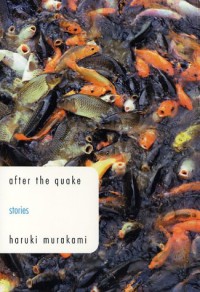 After reading Blind Willow, Sleeping Woman, I was a little leery about what I might find in this short story anthology. However, I was pleasantly surprised. There were fewer stories than in Blind Willow but well developed. The main underlying thread is that the stories take place after the Kobe earthquake or the triggers for each story takes place after the earthquake. In his mundane storytelling style, each of the characters face a major change in their lives that takes them out of the status quo they had be living in. I really enjoyed these stories a lot. If you liked Norwegian Wood, Sputnick Sweetheart, South of the Border West of the Sun, you'll like the anthology. Personally, I enjoy both of his styles.
After reading Blind Willow, Sleeping Woman, I was a little leery about what I might find in this short story anthology. However, I was pleasantly surprised. There were fewer stories than in Blind Willow but well developed. The main underlying thread is that the stories take place after the Kobe earthquake or the triggers for each story takes place after the earthquake. In his mundane storytelling style, each of the characters face a major change in their lives that takes them out of the status quo they had be living in. I really enjoyed these stories a lot. If you liked Norwegian Wood, Sputnick Sweetheart, South of the Border West of the Sun, you'll like the anthology. Personally, I enjoy both of his styles.
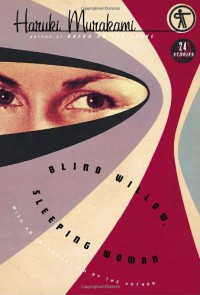 I generally don't like short stories because I find them too short. This anthology of Murakami's short stories has a mix of his mundane story telling to the fantastic magical realism style. I enjoyed some of the stories. A lot of the stories felt too short or had interesting premises but felt under-developed. I still liked them but after reading a few of his intense novels, the short stories just sometimes don't cut it.
I generally don't like short stories because I find them too short. This anthology of Murakami's short stories has a mix of his mundane story telling to the fantastic magical realism style. I enjoyed some of the stories. A lot of the stories felt too short or had interesting premises but felt under-developed. I still liked them but after reading a few of his intense novels, the short stories just sometimes don't cut it.
 This work definitely falls into the alternate reality/surreal/magical realism cluster of Murakami's works. We follow the adventures for several key characters simultaneously and how their fates entwine. First, we follow 15 year old Kafka Tamura (his alias, I can't remember his real name). He's fighting a fate his father has drummed into him that was unavoidable -- he will kill his father and sleep with his mother and sister. Pretty much classic Oedipal with a sister thrown in. Like Oedipus, he tries to thwart this fate by running away so that it doesn't come true. Thus, begins the interesting odyssey.
This work definitely falls into the alternate reality/surreal/magical realism cluster of Murakami's works. We follow the adventures for several key characters simultaneously and how their fates entwine. First, we follow 15 year old Kafka Tamura (his alias, I can't remember his real name). He's fighting a fate his father has drummed into him that was unavoidable -- he will kill his father and sleep with his mother and sister. Pretty much classic Oedipal with a sister thrown in. Like Oedipus, he tries to thwart this fate by running away so that it doesn't come true. Thus, begins the interesting odyssey. This story starts out slower than 1Q94 and Hardboiled Wonderland and the End of the World. It really takes awhile before the connections become more evident (even though it is less obtuse than Hardboiled). I think one of the major themes is dealing with maternal abandonment as well as the incompleteness of living in the past or solely in the present. We also have the concept of shadows.
The other characters were also incredibly fascinating. I was really intrigued with Nakata's thread and also wondered about Hoshino's role as well. Plus, I'm a sucker for talking cats.
While less obtuse than Hardboiled, this book is mired in the surreal and alternate reality and threads. This differs from his other body of work which have dealt primarily with human relationship on a less magical realm so to speak. Readers who loved 1Q84 or Hardboiled will enjoy this tale.
Mortal Arts (Lady Darby, #2)
 Another good mystery by Huber. While the interaction between Gage and Darby serves as a distraction, the mystery has so many twists and turns. A very satisfying story through bittersweet.
Another good mystery by Huber. While the interaction between Gage and Darby serves as a distraction, the mystery has so many twists and turns. A very satisfying story through bittersweet. It is also abundantly clear that the relationship development between Lady Darby and Gage is a series gimmick as it ever so slowly develops. It's nice that it doesn't take center stage but if every ending is going to end up the same hook as previous books, I'm not sure how much patience I'll have with the series with such a shameless marketing ploy. As long as they slowly continue to progress, that's fine -- just not overly slow.
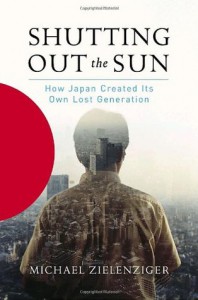 Rewritten and updated review (Sept 4, 2013)
Rewritten and updated review (Sept 4, 2013)This work as approachable and well laid out for the most part. It is an examination of various elements of Japan's society that is causing it to implode. Japan is suffering for its unwillingness to evolve and accept or adapt foreign or new ideas. Once its society had reach its initial post World War II reconstruction efforts, it never re-established new societal goals and left a generation floundering for purpose. Unfortunately, the status quo and ruthless importance of conformity has stifled its citizens and its society.
The first phenomena discussed is those who suffer from hikikimori, people who have completely withdrawn from society and refuses to leave their room. Often times it severe social tramua brought about by class bullying on individuals who just cannot conform or just feel they do not know how to conform to what is expected of them. The stories of individuals suffering for hikikimori as well as the parental despair is very heartbreaking especially since this phenomenon is not brought about by biological imbalance but by social imbalance.
Another issue is the changing expectations of women who now value independence and refuse to subjugate themselves to the role of housewife and mother. Often called the Parasite Single, these women want a career and something for themselves. While some do want a family, the workplace is such that it will not permit them to have both. Also, their male counterparts do not feel the need contribute to duties of childrearing or house keeping and often times shy away from women who earn more or is more educated than they are. With workplace and male adherence to arcane gender roles, women have decided that marriage and children are not worth their loss of independence. Why give up a career, traveling and disposable income to become a slave to a man and a household.
Another eye-opening aspect is the nation's suicide rate which is one of the highest in the industrialized nations. The attitude towards suicide is an interesting one. Zielenziger notes the lack of Judeao-Christian influences could be a factor. Without the stigma associated with suicide, people are more apt to take this way out rather the fighting the immense tide of conformity and subjugation. Methods and group assisted suicides are very accessible.
The off shoot of this is the moral relativism born from a society with no Western influence. While it has its benefits, the disadvantages can be readily seen in its business world as corruption and the lack of will to enforce what is right or wrong and a general defeatist attitude by the general public. With this prevailing attitude, it will inhibit the Japan's ability to recover from its recession and economic woes as it becomes steeped in a game of saving face rather than facing the music and moving on.
The writer also made a comparative case study between Japan and South Korea. While two cultures are similar, South Korea is more agile and willing to take risks, look at different ideas and make radical changes swiftly. This has prevented South Korea from moving in the same trajectory as risk adverse Japan. The author also notes the influences of Christianity which also works against the moral relativism.
This is a compelling look at current modern Japanese Society and how it is suffering from the xenophobic and conformist views that can be traced even as far back as its feudal period. Though towards the end, there are some speculative assertions by the writer, for the most part, he presents a clear picture of Japan's people are suffering from their society's stagnation and its really heart breaking.
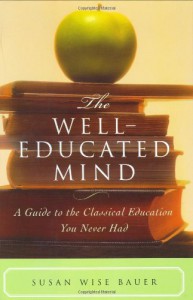 This book just surprised me on many levels. When the library got the book in for me, I was already reading her other work, The Well-Trained Mind and was expecting a rehash but was pleasantly surprised. This approachable work briefly talks about Bauer's own experience with her education. From there, she shares a general plan for the adult to get the classical background that is no longer taught in school. She gives down to earth advice and reaffirmed a few things I had picked up on my own. She covers the area of literature, history, biography/autobiography, and poetry. Each chapter gives you the skinny on the history of the movements (all based on Western civilization) and suggested works to read. She also gives you a method to approach each subject to help train initial lines of inquiry. It was a quick read and a pleasure.
This book just surprised me on many levels. When the library got the book in for me, I was already reading her other work, The Well-Trained Mind and was expecting a rehash but was pleasantly surprised. This approachable work briefly talks about Bauer's own experience with her education. From there, she shares a general plan for the adult to get the classical background that is no longer taught in school. She gives down to earth advice and reaffirmed a few things I had picked up on my own. She covers the area of literature, history, biography/autobiography, and poetry. Each chapter gives you the skinny on the history of the movements (all based on Western civilization) and suggested works to read. She also gives you a method to approach each subject to help train initial lines of inquiry. It was a quick read and a pleasure.
 This book has a lot of great ideas. While I'm not homeschool but supplementing my children's public school education, I really liked the suggestions for logic and rhetoric as well as foreign language study. There are suggested materials and lesson plans so that you approach the subject appropriate to the age level and maturity. It gives a good guideline which I hadn't a clue until I read this book. I did skip over the reading/writing and grammar parts as I had previous read her other book specifically dealing with that topic. I'm not sure how successful I will be in actually teaching my children the classics such as logic, rhetoric and maybe Latin but it'll definite give me something to work off of when the time comes.
This book has a lot of great ideas. While I'm not homeschool but supplementing my children's public school education, I really liked the suggestions for logic and rhetoric as well as foreign language study. There are suggested materials and lesson plans so that you approach the subject appropriate to the age level and maturity. It gives a good guideline which I hadn't a clue until I read this book. I did skip over the reading/writing and grammar parts as I had previous read her other book specifically dealing with that topic. I'm not sure how successful I will be in actually teaching my children the classics such as logic, rhetoric and maybe Latin but it'll definite give me something to work off of when the time comes.
 When I first started this book, I had to say 'what the hell?!?!' But once you reach a certain point, it oddly makes sense though I can't say I necessarily understand everything that is going on.
When I first started this book, I had to say 'what the hell?!?!' But once you reach a certain point, it oddly makes sense though I can't say I necessarily understand everything that is going on.The genius of this story is that it is two parallel stories that are related to each other. The jumbled surreal images eventually make sense though you have to earn it but letting go and allowing yourself to be carried away by the story. I definitely will need to reread this one after mulling over this for awhile.
I do have to say that this is not an easy novel and would caution a casual reader to pick up a different novel by Murakami if they are reading his work for the first time and are not a fan of postmodernist literature. Despite initial misgivings, I'm glad I made it through the book.
ps: I also wonder if the shadow is based on the Jungian shadow. It is the unconscious that knows something is wrong but the conscious mind wants to deny or not readily accept.




